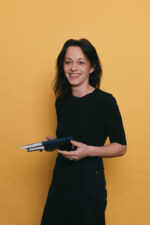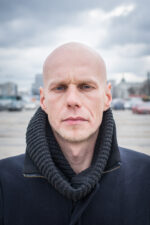PODCAST: Like fire and water. A conversation with Anna Rochowska

Olga Wysocka: How do you start your day?
Anna Rochowska: After waking up, I check my email inbox, then help the kids get together for school. I get to TR around 9.30 a.m., and I will confess immediately that I leave the theatre to go home a little too late, at 7 p.m. A while after taking over as director, I attended a premiere at the Powszechny Theatre. With a smile on my face, I told Paweł Łysak, who is the director there, that I had a lot of work in store for me over the first six months of my term, to which he also replied with a smile: “You are right, just not for six months, but for the whole five years” [laughs].
Igor Stokfiszewski: Do you have a daily ritual at work?
A.R.: Yes, I will go to my office and make coffee for myself. Then, I sit down at the computer and answer emails. Next, I have meetings to attend.
I.S.: What is your routine for leaving the theatre for the night?
A.R.: I hand over the key and say goodbye to the staff. I enjoy this moment very much. This is when I have a moment to talk with them. Unfortunately, I do not have enough time to tour the theatre during the day. I am still learning how to organise my daily work. I would like to leave my office and talk to other staff members more often.
I.S.: This means that you most likely rarely observe what is going on on the stage during the day.
A.R.: I have been running back and forth around this theatre for 26 years already. I miss it a bit, but I must admit that in my role as the theatre director, I cannot walk the corridors as freely as I used to, although perhaps it is just in my head. In any case, I know this theatre like the back of my hand. Since I assumed the position, that is, since 1 September, I have only run a workshop once. At that moment, I felt the freedom to move again.
O.W.: What changed when you became a director?
A.R.: Above all, I am still me, the same Anna Rochowska who took over responsibility for the team at a certain point. I won the competition because I had the team in mind and discussed it a lot, but it took some time before I felt the joy of being a leader.
I.S.: You assumed this position at a difficult time. Could you tell us more about the sources of the institution’s problems and your take on them from today’s perspective?
A.R.: The crisis began four years ago. It stemmed from the actions of the management at the time, who were struggling with professional burnout. More specifically, it was the professional crisis of our artistic director, Grzegorz Jarzyna. We, the team, felt that we could not talk to him on equal terms. We had lost a leader, someone who saw us and listened to us. Natalia Dzieduszycka, tasked with saving the theatre’s budget, introduced some painful changes for the team. Looking back, I realise that this was a valuable lesson for all of us. Unfortunately, it turned out that Natalia did not understand our theatre very well and did not trust the team. She began to hire people who knew even less about theatre and who exhibited violent behaviour. I know this is a strong statement, but it is worth pointing out that the new staff had no skills or intuition.
I.S.: How did the team collaborate with the management at the time?
A.R.: On the one hand, Jarzyna’s artistic endeavours were not going well and, on the other, we had to submit to Dzieduszycka’s orders, which lacked all sensitivity. This lack of unity in the management caused a disruption, which led to a loss of trust in the management on the part of the team. The crisis deepened and frustration grew among the staff. Then the pandemic hit. I think management needs to understand that the team is an asset and needs to be listened to and heard. Solving problems by force is not the answer; solid communication is.
O.W.: Are you aware of the team’s expectations of you as the new director?
A.R.: I think I have exaggerated expectations of my work here, perhaps partly because of the crisis we have been through. As part of the healing programme, we held a workshop on non-violent communication. The second part of the workshop was a mourning ritual. Twelve people out of ninety turned up, so it was not a big turnout. Looking back, I think the workshop was attended by people who needed to grieve. It was an opportunity to discuss my concerns with the team. As I said, I did not feel I was good enough, responsible enough or smart enough to run the theatre. In response, I was told that the team members were finally feeling comfortable and safe at work, so I guess I wasn’t so bad after all. I realised that I did not have to be perfect in every way from day one; I had time to learn. That made me feel better.
O.W.: Let us go back to when you became the theatre director. Do you remember that day?
A.R. I would like to go back to an earlier time. I think I became the director of the theatre because I had worked with the team for a long time and had earned their respect. However, the road to this position was quite tumultuous; we fought as a union to get the previous management sacked. We met with officials at the city’s Culture Bureau and talked about the situation, but to no avail. In the meantime, the Theatre Institute suggested that I become the head of their theatre department. They have a fantastic team of drama educators. They wanted me to be their manager, so I accepted. Meanwhile, things were happening at TR that were the last straw and led to protests from the actors. I had already handed in my resignation, my notice period was running, and I was getting ready to start the new job. This was when the Culture Bureau decided to run a competition for the director of our theatre. Together with the entire theatre staff, we held many interviews with wonderful people from the theatre world and the visual arts who we thought would be great candidates for the job. Then one day, for the first time, we came to the collective conclusion that I should be the one to apply for the position. It was a difficult moment for me because I had just started working at the Theatre Institute. I felt that the IT team trusted me to lead their department; I did not want to let them down. But I had to trust my intuition.
I.S.: I remember you doing something extraordinary. It is not often the case that a candidate nominated by the team wins. Besides, this choice was quite surprising, because the programme you presented did not match the model the theatre followed before. Did this make you feel that you were perceived as the personification of a paradigm shift?
A.R.: No, it did not, but I was well aware that our proposal was a novelty. The fact that I was not running as a duo with a candidate for the theatre’s artistic director was also distinct from what was customary before. Our idea was to plan the theatre programme and management plan to reflect our needs. It was hardly a revolution since we had tried to put all these postulates into practice before. However, I knew I was running against candidates who were much more established in the milieu and more recognised than me.
I.S.: Who were your opponents in the competition?
A.R.: Natalia Dzieduszycka with Michał Merczyński [former head of the National Audiovisual Institute, creator of the Malta Festival in Poznań – ed. note] and Joanna Nawrocka [director of Teatr Ochota – ed. note] with Maciej Nowak [director of the Polski Theatre in Poznań – ed. note]. The other candidate was Ryszard Adamski.
I.S.: Were you inspired by any role models or people you admired when participating in the competition?
A.R.: No, I was not thinking of anyone in particular. The team is the determining factor for me; their needs guide me. My role models are the different people who work at TR. The most important thing is to focus on the common goal and to give your best.
O.W.: You have told a beautiful story, which has led to establishing a new model of running an institution hitherto unheard of on the Polish cultural scene. Together with your team, you prepared and selected a leader who won the competition. Does this arrangement work in practice?
A.R.: I work with wonderful people; we trust each other. Aleksandra Wiśniewska and I [deputy director for finance and organisation – ed. note] share a desk. We had negative associations with the furniture from the time of the previous management, so we wanted to replace it. However, four months passed and it turned out that all we had to do was move the sofa to the other side of the office to make it more comfortable. We sit at the same table in the same kind of chair. But soon we will have to get a bigger desk for both of us, because Aleksandra and I accidentally kick each other when we move our chairs. We would also like to have more light in the room. So it only took a few months to break the spell of the institution..
I.S.: How do you intend to work with the team to ensure their comfort?
A.R.: I think this first season is decisive, so I have noticed a slightly nervous atmosphere. We keep asking ourselves if we are going to succeed. I am creating a complex mosaic that will ensure that everyone can continue to work on what they specialise in and get satisfaction from it; the feeling of success is essential to me. It is also about working together to plan premieres. I do not want to create conflicts, although it is natural that they will arise along the way. We have to talk about what is difficult and defuse any tensions that build up. The team knows that we can have different ideas and discuss those differences. The final decision is mine, but I talk to everyone involved before I make it. We also want to eliminate the idea that we have to implement every suggestion from the programming team. It does not work that way – we always talk everything through. It is always a dialogue.
I.S.: Have you introduced any new formats for team meetings where you discuss topics that are important to the theatre as a whole?
A.R.: We invited Anna Smolar to join us and she suggested some extra activities to bring the team closer together. She met with everyone individually and listened to people’s needs. These meetings led to ideas that we want to implement. For example, it turned out that the team would like to take part in some physical activities. Today, one of our colleagues runs a yoga class on Tuesdays at nine o’clock, but it seems that not many people have taken advantage of this opportunity so far. The same happened with our Domówka [House Party] series of events. On the first day of September, we held our first Domówka in the theatre, and about six hundred people came. We provided entertainment and the atmosphere was great. Some time later we had another one, but not many people came. It was intimate but wonderful, and we read The Moomins, among other things. The next event in the series was something of a throwback, as we looked back at the theatre’s activities and achievements over the past twenty-five years. However, I have heard people say that these events take a long time to organise, that ideas are often spontaneous and that the organisers have to work at a fast pace. So we agreed that if these house parties were causing us more stress than joy, we would give them up. The most important thing for us now is the premieres, so we put a lot of team energy into organising them.
I.S.: Do you, as a team, hold meetings of a different format, for example meetings to gather knowledge about the staff and discuss decisions related to the activities undertaken at the theatre?
A.R.: In the competition entry, we had to explain how to fix communication within the team. At first, we devised ideas for different classes and workshops, but they never happened. I personally think the team does not need them. As I said, we held a workshop on non-violent communication and had a turnout of roughly twenty people, which is not many. We tried to encourage others to participate; we picked a convenient time but did not want to force anyone to come. At the theatre, our core efforts go into organising premieres of shows, so it seemed natural that many people were very busy at work and were too tired to attend. However, I have not given up on holding remedial meetings. I listen to the team and identify their needs.
O.W.: Speaking about the history of your theatre, you mentioned people who experienced professional burnout. Do your employees feel better now? What are the theatre’s energy resources like today?
A.R.: We are still struggling with this issue, and the average age of the team members is a contributing factor, as we have quite a few middle-aged people working with us. However, I hope that we are moving in the right direction and are starting to find a balance. Some people need more time to get back into the swing of things. Some may need to change jobs, which I understand. I want to create working conditions where everyone can look at their job and ask themselves why they are doing it. Maybe they just got used to it. Some people may realise that their job is no longer a source of satisfaction. We have taken the time to understand our situation and come up with the right answers. I firmly believe in the path we have chosen.
O.W.: How do you find those answers?
A.R.: We talk. The first thing Aleksandra Wiśniewska and I planned were meetings with all the employees. I was thrilled that we could speak with employees from the different departments; in some cases, we even had one-on-ones. It was a critical time for us. Aleksandra Wiśniewska got to know the team, and for me, it was an opportunity to see the people I already knew very well from a different angle. In addition, I am highly empathetic and often empathise with other people’s situations. Sometimes, this empathy makes it difficult to make crucial decisions, though.
O.W.: Tell us about your most difficult decision as a director.
A.R.: I have had to let some people go. The most difficult decisions relate to personnel issues, including terminating their contracts. Even if I am certain it must be done, it is challenging and unpleasant for me.
I.S.: Does your theatre need a new identity?
A.R.: I believe in TR’s artistic quality since it is the strength of this theatre. We want to maintain a high artistic level, on par with the outstanding productions that made the theatre famous in the the first decades of the 21st century. What is important to me, and has always been a core value here, is the proximity of the actors on stage and the audience in the auditorium.
O.W.: How would you describe the TR’s primary audience?
A.R.: Our research shows that they are mainly ‘TR patriots’, i.e. our regulars. These people have been visiting us more or less since the premiere of Bzik tropikalny [Tropical Craze] [held in 1997 – ed. note]. This group also includes people from our theatre community. The second group are young people who come to see our performances thanks to our pedagogical initiatives. We think about whom we address our performances to and decide what to recommend to someone who wants to start going to the theatre more often. We have to be careful not to lose the trust of young people. A young audience member will visit us for the first time as part of theatre education at school, the second time will be a class outing, and the third time, he or she will come on their account. This is the idea.
O.W.: Can you tell us more about your pedagogical work with young people?
A.R.: With pleasure! I would like to tell you about our collaboration with a brilliant Polish Studies teacher who once visited us and told us about her class, which had no intellectual aspirations. She approached us with a proposal to involve these students in culture through our workshops. For three years we held classes at her school, training the children in how to approach theatre and how to read performances. Then the class would go to see a play presented at TR, and afterwards we would discuss what they had seen and ask them for their reflections. We developed a strong relationship with the pupils in this class. At one point, one of the girls started coming to see our plays on her own. Although the overall academic level of the class did not appear to be very high, all the pupils passed the final oral exam in Polish Studies with flying colours.
O.W.: Who else is your audience?
A.R.: University students interested in theatre are predisposed to become ‘TR patriots’. Apart from them, a part of the adult audience comes to us by chance, sometimes as a result of a recommendation they got from our sales department. This is the audience we are fighting for, but the results are not always promising. Sometimes, these people return, and sometimes, they do not.
O.W.: You probably have to fight to get young people interested in theatre as well. This challenge is the job of schools, but you have an impressive background in theatre pedagogy. Please tell us how you work with young audiences.
A.R.: My main concern is creating a comfortable, safe space where a young person is not afraid to speak. This applies not only to young people. TR aims to foster an open dialogue between the audience and the theatre staff. We want to talk and hear different voices. We want to find out what works and what does not. I think this is a vital issue.
I.S.: Do you feel that over the years, it has become possible to create a space also for people with disabilities who would like to participate in the cultural offering?
A.R.: Yes, but we still have a lot of work to do. In the beginning we produced one performance per season (the number increased in the following years) with Polish subtitles and later with interpretation into Polish sign language. However, we felt that the audience for these performances was not significant, probably due to the fixed dates we imposed on people with disabilities. So we started to provide Polish audio description and Polish sign language interpretation at every performance. This has created an audience, but we need to continue our efforts to improve accessibility, and there is still a lot to be done. We need to reach out to these people and meet the needs of all audiences, both young people and adults who are not used to going to the theatre. In 2013 we offered seven performances with audio description. We did such an excellent job that people came to see us often. Once a family from Bialystok came to see us. It was a visually impaired family of three. It turned out that Grzegorz Jarzyna’s play was incomprehensible to them. It was then that the son, Kamil, who had been blind since birth, took the floor and explained what this director’s style was all about. I would like to include in the theatre community people who, for various reasons, do not come to TR.
I.S.: Let us talk numbers. How many people visit TR in a year? To the performances and other events, that is.
A.R.: We have performances on roughly 140 nights per year. Each night, there are between 100 and 160 people in the auditorium. Attendance is growing steadily, but to be honest, due to the earlier mismanagement of the theatre, many regulars stopped coming. The pandemic has also done its part. The workshops we run are an essential part of our offer. We noticed that ticket sales increase on the day of the performance – people who have no plans for the evening choose to see a play at the theatre, just as they would go to see a movie. Unfortunately, I cannot give you any specific numbers.
O.W.: The theatre is moving in the future. When is the relocation planned for?
A.R.: The new building is part of the second phase of Thomas Phifer’s architectural project on the Plac Defilad. I use the term ‘second phase’ because the Museum of Modern Art building is almost finished and will open this year. Work has begun on the site next to the museum where our theatre will be built, but it will take some time to complete. The architectural design of the building is innovative, and the theatre stage has been designed to be visible from the outside. When I first heard about this idea from Thomas about ten years ago, I did not think it would work at all. But when I met him this year, he explained his vision in more detail and how the glazing would allow the people of Warsaw to be part of the audience, and I was all for it. Maybe my generation is not ready for full disclosure, but the next generation will be, and they might appreciate this option. I am very optimistic about the new building.
O.W.: We are keeping our fingers crossed that it is erected soon!
I.S.: And thank you for your time.






